To express your concern for someone’s feelings and your desire to avoid saying anything that could cause them to feel distressed or heartbroken, it’s important to use the statement,“I don’t want to hurt you.”
In this article, I have made a list of 15 alternative expressions that will enhance the utterance of a sincere thought that you don’t want to hurt someone who could be your friend, family member or romantic partner.
Attached to each phrase are examples on how to use each phrase in a sentence, so you could be able to apply to whatever context you’re in.
Now when someone you deeply care about misunderstands your intentions, reassure them of your pure motives with any of these phrases.
Substitute Ways to Say “I Don’t Want To Hurt You”
Presented below are 15 other ways one could express that they don’t want to hurt or upset you.
- I’m cautious about how my words might affect you.
- I want to ensure you feel safe with me.
- I wish to protect your heart.
- I want to communicate with love and care.
- I care about your feelings.
- I don’t want to cause you pain.
- I’m here to protect you.
- I want to be gentle with your heart.
- Your well-being is important to me.
- I have no desire to see you in distress.
- I want to be considerate of your emotions.
- I don’t want to bring you any grief.
- I’m committed to being kind to you.
- I don’t want to see you suffer.
- I would never want to upset you.
I’m cautious about how my words might affect you.
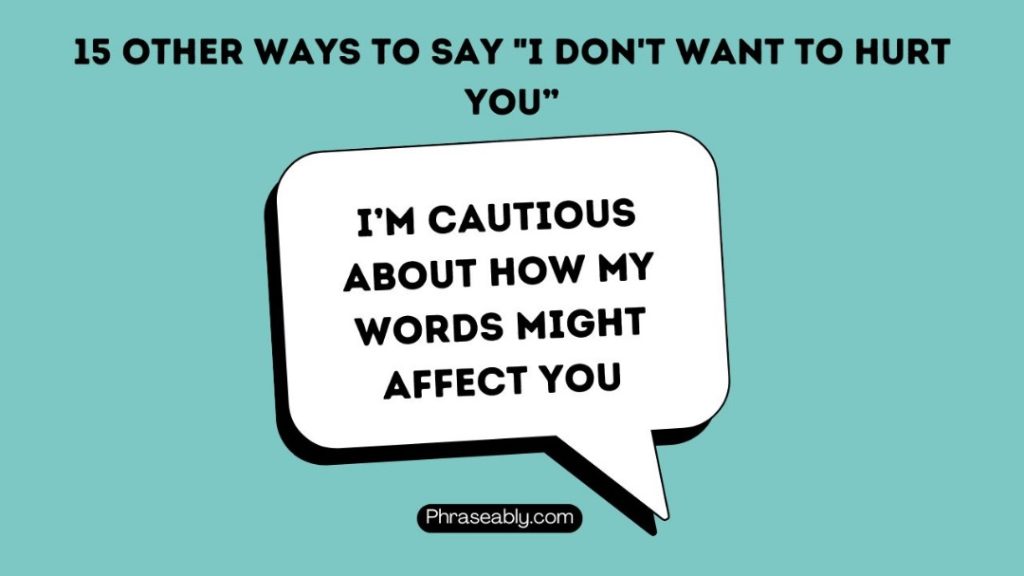
Words have a great impact on people and that’s why you have to be cautious of saying the right words.
Even though it’s not necessarily what the other person would want to hear, you could choose milder words, a positive tone and the right time to say so.
A phrase like this puts into perspective the lack of desire to hurt someone with any form of negative words which makes it a good alternative for the phrase “I don’t want to hurt you.”
Example:
- I’m cautious about how my words might affect you and that’s why I am acting this way.
- My intentions are far from hurting you, I’m cautious about how my words might affect you.
I want to ensure you feel safe with me.
If your intention is not to hurt someone then chances are that you want to protect or keep them safe either physically, psychologically or emotionally.
Saying that you want them to be assured and that your intention is to make them feel safe is another way of saying that you’re not interested in hurting them in any shape or form.
Apart from it being a validating statement, it helps foster trust between you and the individual.
Example:
- You have to know that all I want is to ensure you feel safe with me.
- I can’t bear you getting so worked up, I want to ensure you feel safe with me.
I wish to protect your heart.
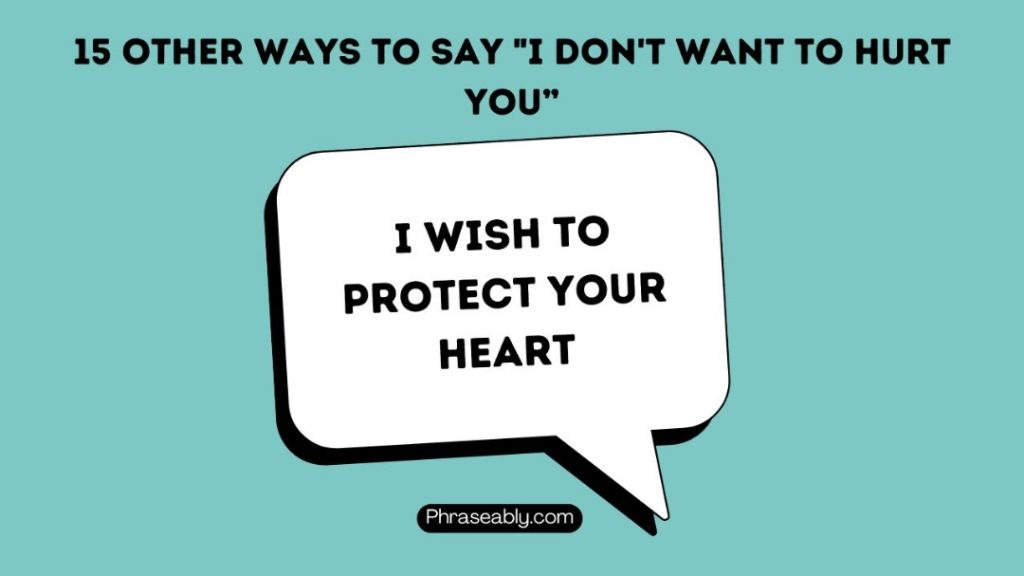
When someone is told that you seek to protect his heart, you’re sending the message that you don’t want to hurt them, especially emotionally.
If anything, you are more than happy to be who they want you to be just so they can be pleased and to be comforted in their hearts. Let’s say you’re resolving a conflict with your partner or friend, you can articulate this phrase to clear the air.
Example:
- Don’t be afraid of being heartbroken because what I truly wish is to protect your heart.
- Have you ever had someone tell you that all they want is to protect your heart?
I want to communicate with love and care.
“I want to communicate with love and care” is another phrase that can be used to interpret that you don’t want to hurt a person.
This expression uses the words ‘love’ and ‘care’ which are regarded as positive words and things that should be included in your expressions when communicating that you deeply care about how a person feels or how you want to take care of them.
Example:
- I want to communicate with love and care, please don’t misunderstand me my dearest.
- If you think what I said was harsh then I’m sorry, I want to communicate with love and care.
I care about your feelings.
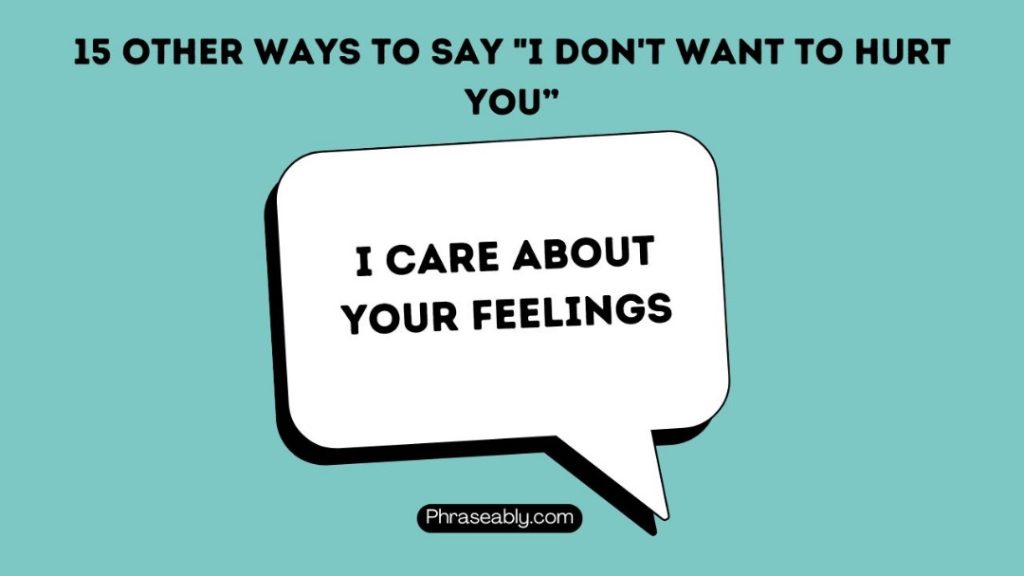
It’s true that how we feel as humans might not always be the fact or reality but that doesn’t mean it’s not valid or can be validated.
This phrase helps to communicate that idea as it suggests that you care about what a person is feeling and would much rather want to see them protected and not hurt.
Next time, when you find yourself in a position where you have to revalidate your love, you can put this phrase to good use.
Example:
- How can I say this? Babe, I care about your feelings honestly.
- I care about your feelings so much that I wouldn’t want to upset you in any way. You have to believe me.
I don’t want to cause you pain.
Instead of saying that you don’t want to hurt someone, you can utilize other dictions to make this phrase, “I don’t want to cause you pain.”
It also passes the message that you want some to be safe and protected and far from any dangerous occurrence in the future.
Adding this to a sentence does not have to be something you worry about anymore because the example below helps you see how to do so.
Example:
- I don’t want to cause you pain or sorrow in times like this, you know how special you are to me right?
- I don’t want to talk right now, I don’t want to cause you pain.
I’m here to protect you.
Another way to say that you don’t want to hurt someone is by saying, ‘I’m here to protect you.’
This way, you are letting the person know that your purpose regarding being in their life is to protect you, and that’s what you plan on doing for as long as they want you in their life.
Maybe your friend is having a mental breakdown or has trust issues, you can make your intentions known with a phrase like this.
Example:
- I’m here to protect you because I know how much you’ve been hurt by others. I will be here for you always.
- I don’t ever want to see you in danger and that is why I am here to protect you.
I want to be gentle with your heart.
“I want to be gentle with your heart,” describes the manner at which you want to handle a person’s heart and how they feel. Being gentle with their heart shows that you consider their heart delicate and tender, a thing worth protecting.
If you are looking for an alternative phrase that’s more detailed about how a person’s heart (a loved one)should be handled, this phrase would be a good option.
Example:
- I want to be gentle with your heart and make you become someone that feels so secure with me. I love you.
- The truth has always been that I want to be gentle with your heart and that’s why I watch what I say around you.
Your well-being is important to me.
“Your well-being is important to me” is another phrase that best substitutes for the phrase that implies that you don’t want to hurt a certain person.
With this expression, you are saying that you place value on the well being of the individual and would much rather not put them in situations or conditions that are dangerous to them.
It is also suitable for a formal setting, for example, in a discussion with your employee who called in sick the previous day.
Example:
- Your well-being is important to me and the company, you can’t afford to come to work when your health is not a hundred percent.
- I don’t intend to make you do what you’re not comfortable with, your wellbeing is important to me.
I have no desire to see you in distress.
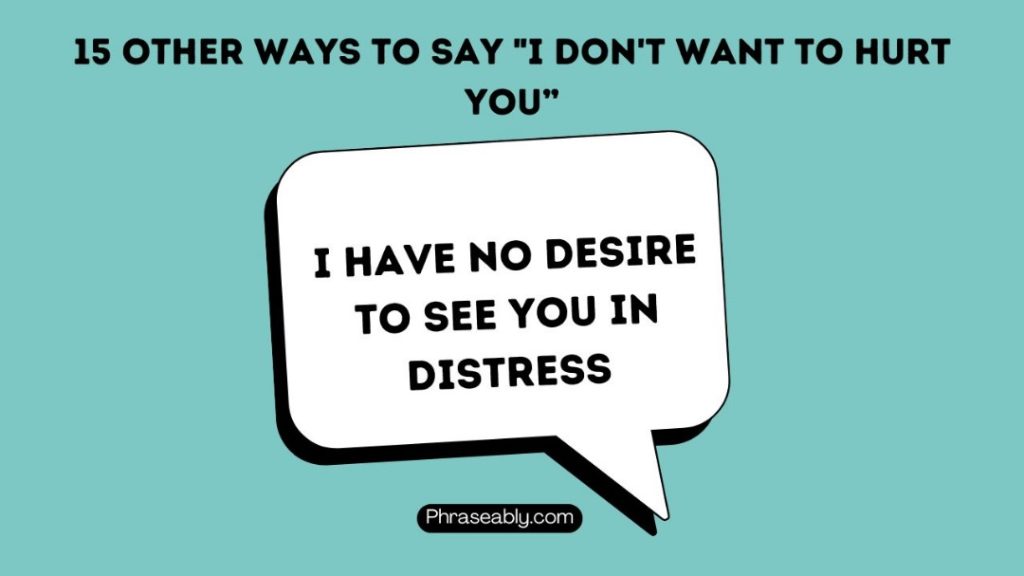
Also, if you want to articulate your desire which is that you don’t want a person to be seen in disarray or discomfort, you can say that through the phrase “I have no desire to see you in distress.”
There are certain people in your life that need to hear words that reassure them of your love and good intentions for them, this choice of phrase can help you do just that.
Example:
- I have no desire to see you in distress, please, don’t leave me when all I have left is you.
- You and I both know that I have no desire to see you in distress, especially, in difficult times like this.
I want to be considerate of your emotions.
In a conversation with a lover or a friend that you’re fond of, you can chip in this phrase if needed to let them know that you are cautious of saying what could hurt them or not.
You are willing to consider their emotions as that could affect their self esteem if you begin to utter words that are negative. It is a good expression that helps set the tone for a tough conversation so as not to be misunderstood.
Example:
- I want to be considerate of your emotions, but this isn’t something that you should be doing at this time, it’s not right.
- Believe me, I want to be considerate of your emotions, that’s why I didn’t say anything at the venue.
I don’t want to bring you any grief.
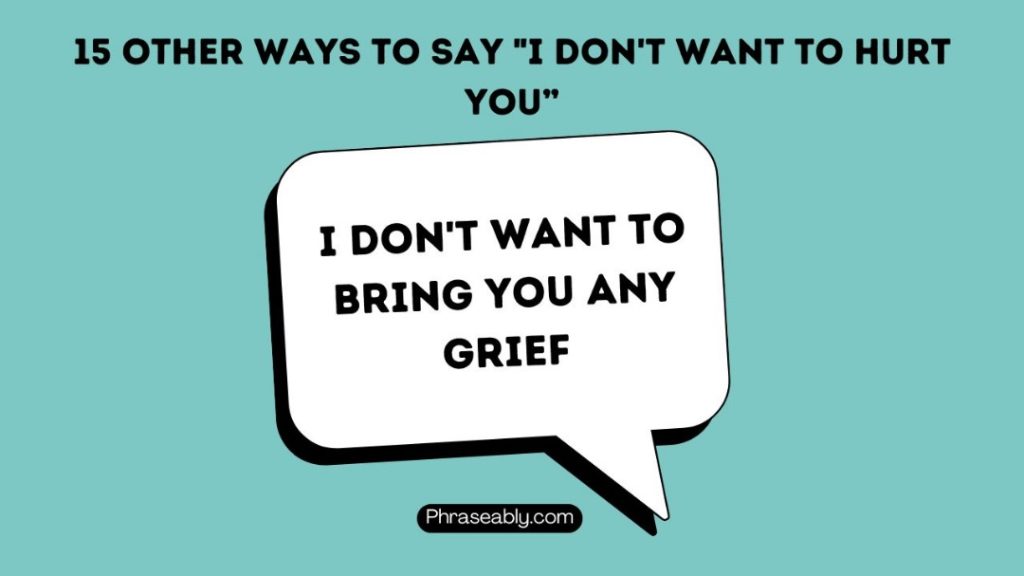
In addition, “I don’t want to bring you any grief” is another phrase that can pass the idea that you don’t want to cause anyone harm.
It also states that you would rather avoid or refrain from doing things that will make them sad or bring worry to their mind. No one would hear this and think that you’re not sincere except your tone lacks sincerity.
Example:
- I don’t want to bring you any grief in any way and that’s what matters to me. I can’t be someone that you think of and you begin to cry.
- My only wish in life is not to bring you any grief, you are someone I deeply care for.
I’m committed to being kind to you.
Being committed or dedicated to being kind to a particular someone means that you truly want the best for them. In this phrase, it helps you say to someone that you are solely devoted to being of your best character to them.
It also means that you would never want to be mean or wicked to them because you truly care about the individual. Let’s see how this phrase can be used in a sentence.
Example:
- Don’t you know that I’m committed to being kind to you? It breaks my heart to hear you say that I don’t love or respect you, you know I do.
- I’m committed to being kind to you because I made a promise to you on the altar, to love and to respect you all the days of my life.
I don’t want to see you suffer.
Maybe whom you’re referring to is someone that has been going through a lot of hardship lately, this would be a soothing word that means that you don’t want someone to be hurt or suffer anymore.
Example:
- This is so hard for me to watch, I don’t want to see you suffer this way. Please just tell the truth and stop all this.
- I don’t want to see you suffer, I love you too much for this to be happening to you without me being able to protect you.
I would never want to upset you.
Similarly, communicating that you don’t want someone to be hurt is also saying that you don’t want to upset them.
Let’s see how it can be used in a sentence.
Example:
- That’s not what I meant to do, I would never want to upset you. Please forgive me.
- I really love you more than words can describe, I would never want to upset you.

